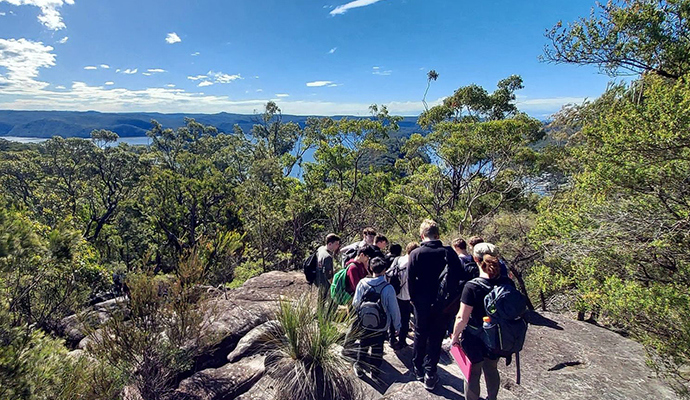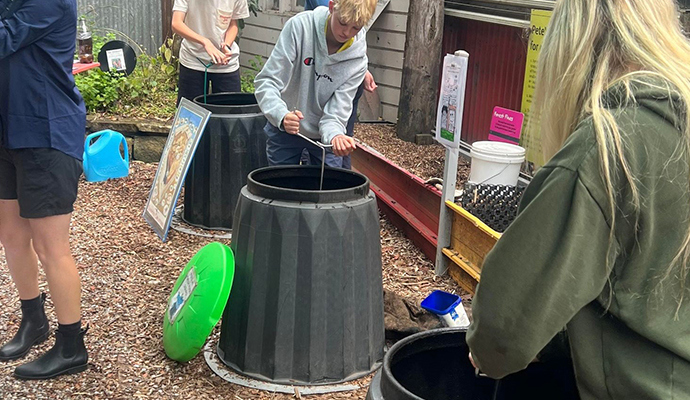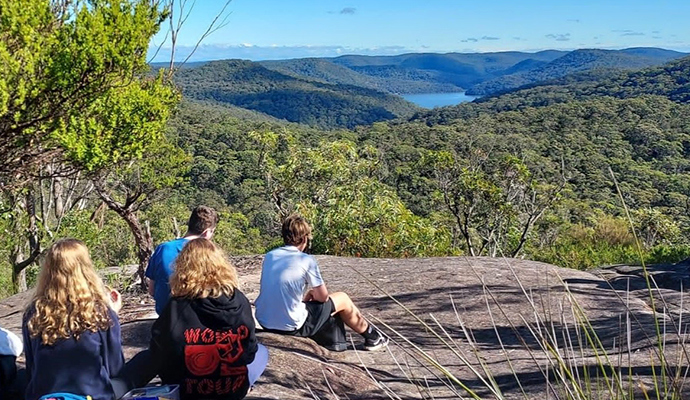Contact
Head of Department: Nicole Bailey
Email: nbailey@barker.nsw.edu.au



Year 9
Year 9
The Stage 5 Elective course for Year 9 is a practical, student-centred course. Students study both the physical and human elements of Geography. There is an overnight fieldwork trip to the Illawarra including a variety of exciting and pertinent activities such as canoeing on the Minnamurra River, a walk through the rainforest, snorkelling near the river’s end, a dairy farm visit and a visit to the Jamberoo Action Park. The Stage 5 Elective course for Year 10 is a different, stand-alone course. A precis of the course content is outlined below for comparison purposes.
The Year 9 topics include oceanography, catchment geography, town planning/infrastructure and a study of chocolate as a primary crop/product. There is plenty of scope for students to explore topics of interest further.
The knowledge and understanding explored in Year 9 Elective Geography includes:
- Catchment Management (including the Minnamurra Fieldtrip)
- Oceanography
- The Geography of Primary Production – with a focus on Cocoa to Chocolate
- Smart Cities – we have linked with the Sydney Science Park (https://www.app.com.au/our-work/sydney-science-parkand) and industry experts to undertake a project wherein students research a “Pillar” (Water, Health, Heat, Health, Transport, Waste, Urban Agriculture) and create a “pitch” of ideas that may become included in the development of the suburbs surrounding Sydney’s new airport.
- Sustainable Futures – including Sustainable Sydney
The skills to be engaged with in Year 9 Elective Geography include:
- Oral presentation skills, guided inquiry, small group work
- Development of written expression skills
- Geographic skills reinforced and used in the context of case studies
- Team building as students work together to create a “pitch” for Sydney Science Park in the STEM School Challenge.
The ICT aspects of Year 9 Elective Geography include:
- Relevant internet work – enhancing research skills, be a “Super Searcher”
- Geographic Information Systems (GIS) – spatial analysis
- Google Earth Pro, ArcView On-line and NSW Globe
- Interactive on-line fieldwork activities
- Simulation games
The Fieldwork students engage in during Year 9 Elective Geography consist of: - Rainforest to Sea to the Land - Illawarra/Jamberoo Fieldtrip (two nights)
- Sydney Science Park – Luddenham – a fieldwork day takes place at a site adjacent to Sydney’s new airport. Students learn about various aspects of building the new suburbs for our Aerotropolis. Some students will also go on to a final expo day later in the year.
- Sustainable Living – Kimbriki Resource Recovery Centre – Ingleside and Narrabeen Lakes
Assessment
The Year 9 Geography Assessment Program includes:
- A Catchment Studies and Oceanography fieldwork report based on the Illawarra Fieldwork with some short answer questions regarding the Oceanography topic.
- The second task regards Primary Production wherein students prepare an ICT presentation for delivery in class. The students also complete some short answer questions.
- Task 3 pertains to Weather and Climate as an in-class test.
- The final assessment is the Semester 2 Examination; a written examination of geographical skills learnt throughout the year and on topics studied in the second half of the year.
Year 10
Year 10
This course is complementary to our other courses. Whilst it builds on the skills and concepts of the other Geography courses, the material covered is almost entirely different. A student choosing Elective Geography in Year 10 can be assured that they will be in a completely different course to compulsory Geography.
The course is broken into four topics, one per term. Two topics are human Geography and the other two are physical Geography (and how humans interact with it).
Topic One is called “We’re on Fire”, looking at the range of natural disasters including tectonic activity but focusing largely upon fire in Australia, especially in our area. Students will engage with a volcanic eruption scenario, make choices based on geographic knowledge such as when and where to evacuate. They will undertake a case study where they plan for a fire and map their ideas, for example where could be back burnt? Where could there be fire breaks? There will be an opportunity for learning Geographical Information Systems (GIS) skills. These are highly sought after in many industries and in all levels of government and Emergency Services.
Topic Two is called “Poles Apart/A View to a Krill”. Starting at the North Pole, it examines the home of polar bears, navigable passages and retreating ice as Climate Change makes its presence felt. Then we head south, stopping near the Equator at one of our nearest neighbours, and a place where Barker has had a presence, Timor-Leste. This is a guided study including information from the visits of previous Barker Year 10s. It finishes by visiting Antarctica. Students will make their own choice as to an aspect of Antarctica which they wish to investigate in greater depth.
Topic Three is a Transcontinental Transect. Students will have a choice of a trans-continental journey in one of three continents, Europe, North America or Australia. With the Northern Hemisphere options, they will mimic the Transcontinental Race, a self-supported bicycle race across Europe or the US. Riders choose routes between stops, based on the physical attributes of both the land and the riders. The Australian option is a trip down the Murray-Darling River system; learning more about the inland of our great continent. They investigate features such as tourist attractions, elevation, climate, flora and fauna, urban areas and rivers.
Topic Four sees a shift to some Political Geography in a unit we call United Nations?! Starting with the good news from Factfulness we challenge current thoughts regarding Developing and Developed Nations, exploring “Ten reasons why we’re wrong about the world and why things are better than you think!” Attention turns then to global conflicts; causes and resolutions. Students investigate their choice of conflict and create a StoryMap, an ArcGIS industry-based program, to display what they have learnt.
Join us as we seek to challenge students to examine the environmental and human characteristics of our world. We explore ways of managing the future of places including their environmental, economic and social sustainability. We seek to provide students with the intellectual and technical skills to become critical thinkers, life-long learners and active citizens.”
Year 10 Assessment
Year 10 Elective Geography’s assessment schedule has been designed to be somewhat more progressive than the Mandatory Courses’ assessment schedule. Students will employ a range of strategies and programs that will give them skills with GISs (Geographic Information Systems) that are highly sought after in the vocational world.
Term 1: Fieldwork and map-reading skills
Term 2: Podcast exploring aspects of Timor-Leste
Term 3: Google Earth Transect
Term 4: A global conflict StoryMap using ArcGIS.
Year 11
Preliminary and HSC Course
Geography’s exciting new offering, a brand-new syllabus, was offered for the first time in Year 11 – 2024 heading into Year 12 – 2025. The new course offers students a good look at a number of the “hot” issues facing the planet. The topics listed below will also have integrated geographic skills – many of which are new economy skills of interpreting data and spatially rectified information.
The Preliminary course includes the following topics:
1. Earth’s Natural Systems – an overview of the uniqueness and diversity of the Earth, a look at processes, cycles and circulations connecting natural systems and an exploration of natural systems and land cover change.
2. People, Patterns and Processes – an overview of the diversity and extent of human activity, a study of population and resource consumption and a focus on local places and global economic change.
3. Human–environment Interactions – an overview of change to Earth’s natural systems over time, a look at land use and land cover change and a study of a geographic region (South-east Asia) and
4. A Geographic Investigation – which will be conducted concurrently with two of the units above.
The HSC course includes the following topics:
1. Ecosystems and Global Biodiversity – an overview of ecosystems and biodiversity, an investigation of two different ecosystems, coral reefs and river deltas, and their management.
2. Global Sustainability – an overview of sustainability in the contemporary world, an evaluation of sustainability practices and an investigation of a global economic activity – coffee production and
3. Rural and Urban Places – a study of rural and urban settlement patterns, an investigation of a rural (Dubbo) and an urban place (Parramatta) and an investigation of a large city outside of Australia (Los Angeles).
Geographers On the Move - Fieldwork
Year 11 Geographers head out into the field from Term 1.
Term 1 – Stockton Beach Fieldwork (two days staying overnight).
Term 3 holidays – an optional trip to the Great Barrier Reef (five days, four nights).
Term 4 – Chowder Bay.
Jobs for Geographers
More and more, students with geographical skills are highly sought after. Hear what Royal Society Director, Professor Joe Smith has to say about why you should choose Geography.
Year 11 Assessment
Task 1: Earth’s Natural Systems - Short Answers and Geographical Investigation component (40%)
Task 2: StoryMap on Geographical Investigation (20%)
Task 3: End of Course examination (40%)

